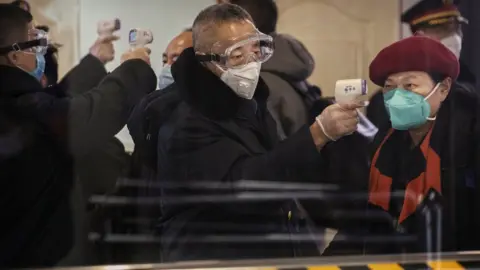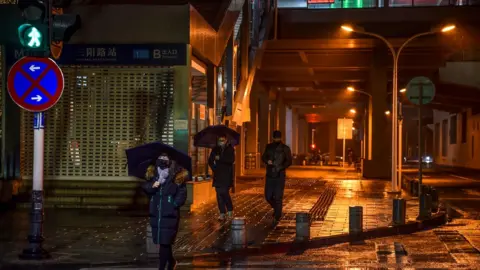Coronavirus: Life as a foreigner in Wuhan
 Jan Robert R Go
Jan Robert R Go At least 10 Chinese cities are in lockdown in a bid to manage the spread of a new strain of coronavirus but what's it like for those in the quarantine zone?
The country's death toll has so far risen to 41 and authorities have put in place travel restrictions in Hubei province.
Authorities say this new virus started in a seafood market in Wuhan which "conducted illegal transactions of wild animals".
Currently known as 2019-nCoV, this particular strain has not been previously identified in humans.

Chongthan Pepe Bifhowjit an Indian student at the Wuhan University of Technology spoke to the BBC's Gaggan Sabherwal.
"Last week the situation was stable but things have drastically changed - this has made me very scared. I have never faced a situation like this before.
"But the university and authorities are very good. They are looking after us well.
"My university is checking every student's body temperature every day and are offering free masks. It also has its own hospital and ambulance.
"We have been advised to wash our hands every hour, avoid eating outside and wear our masks every time we come out of our rooms.
"We are all staying in our rooms and only visit our friends in rooms that are close to ours."

A female international student living in Wuhan for six years spoke to BBC Outside Source anonymously.
"I live on campus but many people have gone back home so it's pretty quiet over here and it's normal around about now to not have people around.
"But then to know that even outside of the campus that everything is closed down just shows how serious the whole situation is because of the lockdown.
"That makes me actually feel safe but we don't know when things are going to go back to normal.
"There is sometimes too much information because we have group chats [on apps] where people are just posting news they are reading online, so you don't really know what is true, or what is not true.
"When the whole lockdown happened, there was news that the city was going to be disinfected with effort spray and disinfectant in the air and all that, but then later on it came out that it's not true. There's nothing like that happening.
"We just have to wait for official notices.
"In December, there were messages in my class group that said Sars was back and then we found out it was something else.
"And now we find out it's spreading, actually spreading outside of the city and now there's so much public attention.
"It seemed like they was sitting on it or they were trying to control everything on their own.
"But then now, there's more external pressure so they are moving much faster."

Jan Robert R Go is from the Philippines and is living in Wuhan while he studies for his doctorate in political theory, at Central China Normal University he spoke to BBC News.
"I'm an international student and we've been advised not to leave our rooms unless it's necessary - and even then we have to take extra precautions.
"I've been taking the precautions advised - it's about keeping yourself clean and, of course, wearing masks is mandatory.
 Getty Images
Getty Images"Because I'm living in school dormitories, the university is providing us with free facemasks and free soap to wash ourselves with.
"The university is providing us with what we need. They are making us feel safe."

A doctor at a hospital in Wuhan also spoke to BBC News.
"The virus is now spreading at an alarming rate. The hospitals have been flooding with thousands of patients, who wait hours to see a doctor - you can imagine their panic.
"Normally, Wuhan is a great place to live and we are proud of our work - specialists here have developed a guide for coronavirus diagnosis and treatment.
"But I am scared because this is a new virus and the figures are worrying.

Daniel Pekarek is a software engineering student at Wuhan University, currently in the city, and spoke to the BBC's World at One radio programme.
"I'm not sure what I should do, because I'm all alone here in Wuhan. I've got some friends who study at the university as well and we have all decided to stay in our rooms.
"I heard about this infection in December but back then nobody cared about it - but right now, it's getting out of hand.
"People are not able to go in or out of Wuhan easily right now. I can go out of my apartment, I can move around in Wuhan by foot, but public transport is all blocked right now.
 AFP/Getty
AFP/Getty"I might not be able to pay the water, so I might run out of water. It's complicated here, I need to take a card and I need to go to a special office here to charge it but everyone is out because it's Chinese New Year and I've got nobody with me who can speak Chinese because my girlfriend is out of town.
"I was planning to stay in my apartment because I'm scared to go to the gym and I'm scared to go to out in public."

Another international student in Wuhan, who had planned to leave the city, also spoke to BBC Outside Source anonymously.
"Flights coming in and flights leaving Wuhan have also been cancelled.
"It's quite deserted. There are no taxis around. Most of the people we found in the supermarket were basically foreigners who were now trying to restock their fridge.
"The [Chinese] nationals are more informed because they use Weibo, they use other social-media platforms that most foreigners do not use.
"Before we are allowed into our hostel, they point something at your forehead. Then, they record your temperature.
"So most foreigners are basically in their rooms and don't go out after 17:00.
"At airports and various places, there are police cars that have blocked the road. They've given the directive that unless there is something serious, movement is not permitted and they've given us emergency numbers that if you have symptoms, you call and they will come and get you."
